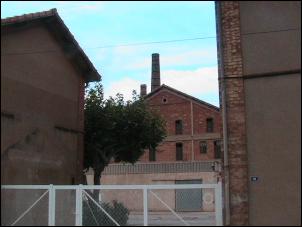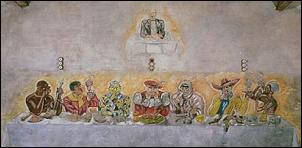Les Yeux On France: Forgetting to Remember
Les Yeux On France: Forgetting to Remember Deportation Camp

![]() Scoop Audio: Click here to listen to
this
Scoop Audio: Click here to listen to
this
edition of Les Yeux on
France
*******
Tens of thousands of tourists visited Aix-en-Provence last year for the centenary of the death of the painter Paul Cézanne. Another major landmark in the Bouches-du-Rhône area is the ‘Camp des Milles’, the only World War Two era internment, transit and deportation camp in France still in relatively good condition. Yet a dynamic project to create a memorial fit to mark this important site is so far unrealised. The ‘Camp des Milles’, from which 2,500 Jewish men, women and children were sent to the death camp of Auschwitz, has been waiting for the financing it has been promised by the French state for over two years.

(AIX-EN-PROVENCE – 10 February 2007) – In an ordinary street, in a typical village, the imposing red brick buildings of the tile factory immediately catch your eyes. Part of the site is still commercially active, and most passers-by on the highway between Marseille and Aix-en-Provence have little idea of the regional, national and international significance of what happened here.
It was in these very same buildings that, from 1939 until 1942, at least 10,000 people were interned. Foreigners for the most part, in the beginning it was Austrian and German refugees fleeing the Nazis. After the victory of the Franco regime in Spain, many communists also fled to France. Marseille was the only major unoccupied port in the region, so it was an important transit point for those seeking to emigrate. The presence of many intellectuals and artists, such as Max Ernst, Golo Mann and Hans Bellmer, meant that an active cultural life was soon established in the camp. Visitors can still see the colourful frescos in one of the smaller buildings.
On 22 June 1940, the French-German Armistice was signed and the fascist Vichy Government took power in the south of France. In line with the heightened xenophobia and repression of this period, foreigners of all nationalities were interned at the camp, particularly Jews and Communists. Finally, and most sinisterly, in August and September 1942, before the German occupation, more than 2,500 Jewish men, women and children were sent by train to the death camp of Auschwitz. The Germans closed the camp soon after taking the south of France.
The good condition of the buildings and the considerable size of the site of the former camp (15 thousand metres squared) mean it presents a rare opportunity to commemorate a tragic episode in the history of France and Europe. According to Alain Chouraqui, president of the committee in charge of the project to create a memorial, its potential is considerable.
This project, Chouraqui tells Scoop, has three dimensions: ‘memorial, educational and cultural.’ The sociologist explains that, beyond the preservation and presentation of historical information, the planned museum will present ‘the mechanisms which transform a democracy into something barbaric’. The Camp des Milles Memorial will illustrate this ‘permanent and universal’ mechanism in a concrete form, as something we should all be wary of. It will be a unique site not only in France, but also in Europe.
It seems like the ideal time for such a project to be undertaken. Jacques Chirac is the first President to have recognised France’s responsibility in deporting Jews during World War Two. At a time when debate over the duty to remember France’s history has been prolific, it is somewhat of a paradox that there is no notable memorial on any of the former deportation camps. The Camp des Milles presents the best opportunity to remedy this dilemma.
Selected from competitors across Europe, the architectural firm Atelier Novembre had been chosen by the ‘Remember the Camp des Milles Association’ to create the museum. To begin the work, 14 million euros is required. In July 2005, the State promised a mere 2 million euros. Fortunately for the project, various local collectives, as well as the National Foundation for the Holocaust, rose to the occasion and are providing the majority of the funding.
The 2 million euros pledged by the State is yet to materialise, which is putting the entire project on hold. And the debacle over financing has been ongoing. On 30 March 2005, for example, La Tribune de Gèneve published an article titled ‘The Camp des Milles has no memorial for want of sufficient funds’. La Provence published an article in November 2005 called ‘Why is the State taking so long to finance?’ and in April 2006: ‘The memorial project blocked by the State’.
After no word from the government for several months, the Minister of Culture Renaud Donnedieu de Vabres visited the site on the 20 May 2006. The regional paper La Marseillaise reflected the cynicism felt by many with the words: ‘Like many other officials before him, he expressed his interest in the site. As with past visits, nothing concrete was announced. Despite the fact that the Minister announced he wasn’t there for nothing.’
A study undertaken in October 2004 by the Cultural and Communication Laboratory of the University of Avignon illustrated that the potential visitation of the memorial could exceed 100,000 visitors a year. This would depend, however, on the project having sufficient resources.
For now, Keterine Aruaud, employee at the Aix-en-Provence Tourism Office, tells Scoop that there aren’t too many enquiries on the former camp. There is a brochure if you ask, ‘but everyone is here for the centenary of Cezanne’.
If possible, work on the Camp des Milles Memorial will recommence in 2007 and be completed by the end of 2008. One day, maybe, tourists will flock to remember the deportations.
Yasmine Ryan is a graduate of the University of Auckland, in Political Studies and French language. She is currently completing a Masters degree in International Journalism at the Institut d’Etudes Politiques, Aix-en-Provence.
ENDS


 Gordon Campbell: On NZ’s Silence Over Gaza, And Creeping Health Privatisation
Gordon Campbell: On NZ’s Silence Over Gaza, And Creeping Health Privatisation Richard S. Ehrlich: Pakistan & China Down 6 Indian Warplanes
Richard S. Ehrlich: Pakistan & China Down 6 Indian Warplanes Keith Rankin: War In Sudan
Keith Rankin: War In Sudan Ramzy Baroud: Netanyahu's Endgame - Isolation And The Shattered Illusion Of Power
Ramzy Baroud: Netanyahu's Endgame - Isolation And The Shattered Illusion Of Power Jeremy Rose: Starvation Of Gaza A Continuation Of A Decades-old Plan
Jeremy Rose: Starvation Of Gaza A Continuation Of A Decades-old Plan Keith Rankin: The Aratere And The New Zealand Main Trunk Line
Keith Rankin: The Aratere And The New Zealand Main Trunk Line